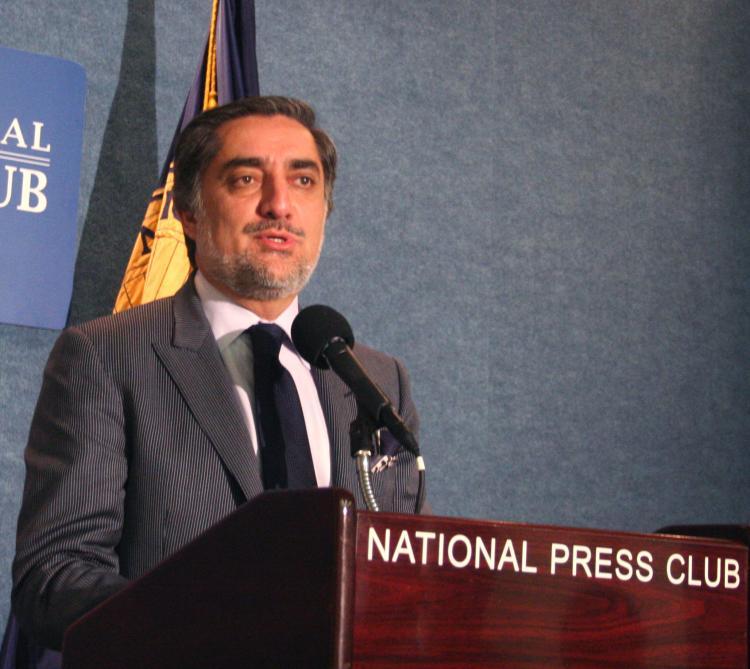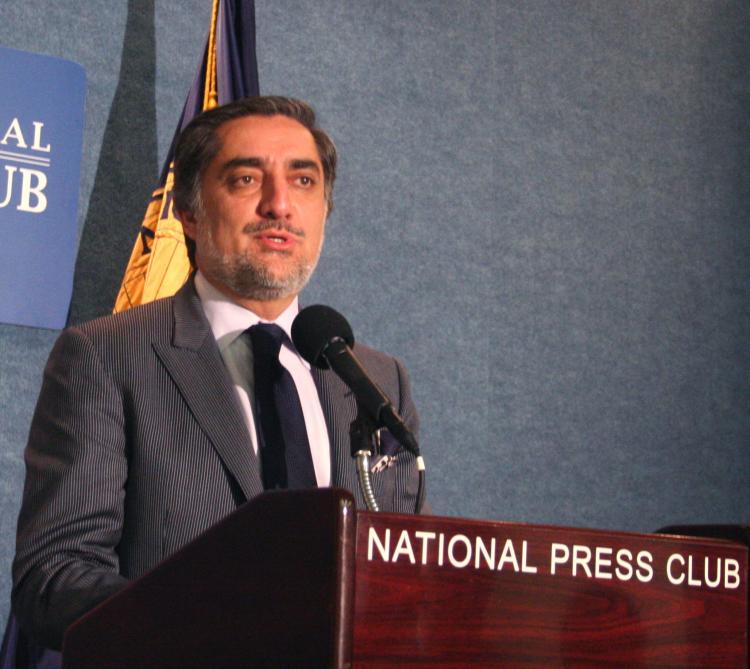WASHINGTON—Former Afghan foreign affairs minister, and chief opponent in the 2009 election, Dr. Abdullah Abdullah said that the Afghan government must make progress toward “winning the hearts and minds” of the people. This includes curbing corruption, providing good governance, educating Afghan children, and improving the status of women.
The military side of the struggle against the Taliban gets the most coverage, but “most critical is the democratic process, not the military aspects,” Abdullah said in a speech at the National Press Club in Washington, D.C., on May 24.
“We can’t take this aspect of the situation lightly. The urgency of the problem is not realized,” he said.
“We cannot afford to fail. ... Failure is a missed opportunity forever.”
While in the American capital, Abdullah visited various D.C. think tanks, as well as officials, including Senate Foreign Relations Committee Chairman John Kerry (D-Mass.) and John McCain (R-Ariz.) as well as members of Congress, including chairman of the House Foreign Affairs Committee, Howard L. Berman (D-Calif.).
However, he was not invited to meet with anyone from the Obama administration, although he thought it was still a possibility.
Just the week before, Obama had rolled out the red carpet for Abdullah’s rival, Afghan President Hamid Karzai.
At the press conference, Abdullah was asked about the dissimilar treatment accorded the two Afghan leaders. He said that he didn’t see it from that angle and that the purposes of their trips were different. He then criticized the question.
“Don’t ask, ‘who is the better one, who is not, what’s the alternative’,” he said.
Afghan Government—Not an Ideal Partner
Abdullah said he recognized that between the two partners—the Afghanistan government and coalition forces—the former has not been effective. Nevertheless, the West must continue to work with the government.
“But it is [your] partner, you have no choice but to recognize the Afghan president despite what happened in the election. You have to deal with him,” said Abdullah.
He also said that much focus on criticizing Karzai and the government is misguided. The most important concern of the West should be the democratic process and aspects related to making that a reality. “Winning the people is winning the war,” he said.
“The election—we know what happened. We should not let it happen again,” he said directing his comment to the West.
According to international observers, the election last fall had fraudulent ballots that generally favored Karzai.
“A lax registration process led to multiple registrations and the registration of ineligible voters. As a result, there is widespread agreement that substantially more Afghans are registered to vote than there are eligible voters,” reported the National Democratic Institute that had 100 election observers on the ground during the vote.
Abdullah pulled out of the runoff on Nov. 1, 2009, because he regarded that as rigged as well. Abdullah’s opposition alliance, “Coalition for Hope and Change,” however, plans to field candidates in the parliamentary elections scheduled for the fall.
On PBS “NewsHour” on May 21, Abdullah was asked if he had seen progress in the Karzai government in curbing corruption. He responded, “No progress at all.”
Abdullah said that the Afghan side of the partnership has not been promising. “There is a growing gap between the people and the government that affects all of us.” He said that Afghans need to speak with one voice, with a common policy and vision that the people can unite behind and contribute to its further success.
“This is the part that is missing, that the Afghan side has not been able to do on its own.”
Abdullah also commented on the statement by Gen. McChrystal, head of U.S. and NATO forces in Afghanistan, who said that neither the Taliban nor the coalition forces was winning. Abdullah asked how is it that with nearly 100,000 troops, 46 countries and billions of dollars spent, with the finest military in the world facing against 30,000 insurgents that all that can be said is that the Taliban is not winning?
“I think losing the people because of the failures of the current government in Afghanistan is one main factor,” Abdullah told “NewsHour.”
Reconciling With the Taliban
At the Afghanistan Conference in London at the end of January, the Karzai government and world leaders from 60 countries, including the United States, established the “peace and reintegration fund” to persuade low and middle level “moderate” Taliban fighters to lay down their weapons in exchange for money and work.
Abdullah disagrees with a policy of negotiating with the Taliban. He says it is bringing the country down and “taking it back to the old days when the Taliban ruled and made Afghanistan into the capital of international terrorism.”
“To me, the meaning of reconciliation is much broader than talking to 30,000 [insurgents]. It is really about reaching out to the people and changing the environment, issues of governing, fighting corruption … changing the lives of the people and many things that accompany that,” he said.
The military side of the struggle against the Taliban gets the most coverage, but “most critical is the democratic process, not the military aspects,” Abdullah said in a speech at the National Press Club in Washington, D.C., on May 24.
“We can’t take this aspect of the situation lightly. The urgency of the problem is not realized,” he said.
“We cannot afford to fail. ... Failure is a missed opportunity forever.”
While in the American capital, Abdullah visited various D.C. think tanks, as well as officials, including Senate Foreign Relations Committee Chairman John Kerry (D-Mass.) and John McCain (R-Ariz.) as well as members of Congress, including chairman of the House Foreign Affairs Committee, Howard L. Berman (D-Calif.).
However, he was not invited to meet with anyone from the Obama administration, although he thought it was still a possibility.
Just the week before, Obama had rolled out the red carpet for Abdullah’s rival, Afghan President Hamid Karzai.
At the press conference, Abdullah was asked about the dissimilar treatment accorded the two Afghan leaders. He said that he didn’t see it from that angle and that the purposes of their trips were different. He then criticized the question.
“Don’t ask, ‘who is the better one, who is not, what’s the alternative’,” he said.
Afghan Government—Not an Ideal Partner
Abdullah said he recognized that between the two partners—the Afghanistan government and coalition forces—the former has not been effective. Nevertheless, the West must continue to work with the government.
“But it is [your] partner, you have no choice but to recognize the Afghan president despite what happened in the election. You have to deal with him,” said Abdullah.
He also said that much focus on criticizing Karzai and the government is misguided. The most important concern of the West should be the democratic process and aspects related to making that a reality. “Winning the people is winning the war,” he said.
“The election—we know what happened. We should not let it happen again,” he said directing his comment to the West.
According to international observers, the election last fall had fraudulent ballots that generally favored Karzai.
“A lax registration process led to multiple registrations and the registration of ineligible voters. As a result, there is widespread agreement that substantially more Afghans are registered to vote than there are eligible voters,” reported the National Democratic Institute that had 100 election observers on the ground during the vote.
Abdullah pulled out of the runoff on Nov. 1, 2009, because he regarded that as rigged as well. Abdullah’s opposition alliance, “Coalition for Hope and Change,” however, plans to field candidates in the parliamentary elections scheduled for the fall.
On PBS “NewsHour” on May 21, Abdullah was asked if he had seen progress in the Karzai government in curbing corruption. He responded, “No progress at all.”
Abdullah said that the Afghan side of the partnership has not been promising. “There is a growing gap between the people and the government that affects all of us.” He said that Afghans need to speak with one voice, with a common policy and vision that the people can unite behind and contribute to its further success.
“This is the part that is missing, that the Afghan side has not been able to do on its own.”
Abdullah also commented on the statement by Gen. McChrystal, head of U.S. and NATO forces in Afghanistan, who said that neither the Taliban nor the coalition forces was winning. Abdullah asked how is it that with nearly 100,000 troops, 46 countries and billions of dollars spent, with the finest military in the world facing against 30,000 insurgents that all that can be said is that the Taliban is not winning?
“I think losing the people because of the failures of the current government in Afghanistan is one main factor,” Abdullah told “NewsHour.”
Reconciling With the Taliban
At the Afghanistan Conference in London at the end of January, the Karzai government and world leaders from 60 countries, including the United States, established the “peace and reintegration fund” to persuade low and middle level “moderate” Taliban fighters to lay down their weapons in exchange for money and work.
Abdullah disagrees with a policy of negotiating with the Taliban. He says it is bringing the country down and “taking it back to the old days when the Taliban ruled and made Afghanistan into the capital of international terrorism.”
“To me, the meaning of reconciliation is much broader than talking to 30,000 [insurgents]. It is really about reaching out to the people and changing the environment, issues of governing, fighting corruption … changing the lives of the people and many things that accompany that,” he said.





